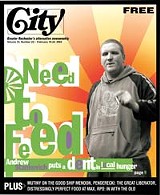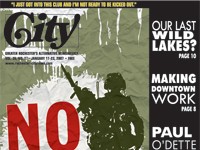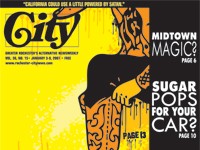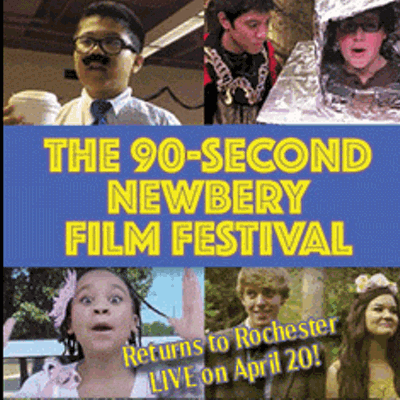[
{
"name": "500x250 Ad",
"insertPoint": "5",
"component": "15667920",
"parentWrapperClass": "",
"requiredCountToDisplay": "1"
}
]
Andrew Stankevich is as big as his job. Nonchalantly chain-smoking Newports and guzzling coffee, he cheerfully confronts non-stop adversity head on. And there's plenty to go around when you're responsible for feeding the poor.
A nervous chuckle escapes as Stankevich's 24-foot delivery truck dies a slow death, steadily bleeding coolant out of a crack in its block. Stankevich shrugs off stress whenever city inspectors scrutinize the Friends Helping Friends warehouse he runs for strict compliance or the slightest infraction. He smiles despite the fact his job is borne of want and desperation. FHF operates in the red, but Stankevich happily perseveres.
FHF's new, expansive location, a warehouse at 367 Lyell Avenue, stands unassumingly in one of Rochester's more desolate industrial enclaves. It's flanked by worn brick buildings with boarded-up windows. A run-down topless bar sits across the street. The whole scene looks war-torn and bleak. But inside the warehouse --- though it's heated exclusively by a small, overtaxed space heater --- things are humming like Santa's workshop.
The 6,000-square-foot space is sparsely decorated with random pieces of furniture and various garage-sale rejects. In the meeting area, an empty magazine rack stands by a 10-inch black-and-white TV with a jury-rigged antenna. Several shade-less lamps provide garish illumination. The far wall of the meeting room has been haphazardly painted an odd, deep azure --- the color of blood if it were blue. Fitting. It's freezing in here.
Stankevich's responsibilities pull him from one end of the building to another. The phone never shuts up. Pausing briefly, he crushes his cigarette butt in a "#1 Mom" coffee mug, and perches his linebacker build on the edge of one of the worn couches to discuss it all. There seems to be no end in sight.
"We're struggling right now," he says. "We're not making a lot of money. But I'm happy to work for less than I can get because I like the organization I work for, and I see the tremendous potential." Potential in the new building, for instance.
It's clear that Stankevich, 26, is a multi-tasking fool. Busy as hell, he still manages to keep cucumber cool. The ever-present smile on his flushed face threatens at any moment to turn into a laugh.
And it's Stankevich who hesitantly --- even reluctantly --- accepts the role as FHF's mouthpiece. He's not so much evasive as he is steadfast and focused on the job at hand. It's never about him. And that is precisely why this story is about him.
Stankevich grew up in Fairfax, Virginia, and wound up living in Rochester by accident.
"I was visiting my brother at RIT and my car broke down while I was here," he says. So he stayed, eventually starting the Rochester chapter of Food Not Bombs (now known as Friends Helping Friends) in August, 1998.
"I'd worked at other Food Not Bombs chapters around the country. When I'd go to a new town, I'd go to Food Not Bombs and hang out," he says. "I guess that's what got me into it. I liked what they were doing." And he saw a need here.
"What really motivated me to do this was seeing that there was an enormous amount of waste as far as perishable groceries," he says. "With our program we deal with stuff no one else will take."
FHF willingly handles perishable groceries in large quantities --- up to 10,000 pounds a week --- and distributes them to people in need.
"We serve between 300 and 500 homes a week," says Food Not Bombs board member Mary Miller, who speculates that "about 30 per cent of Rochester is not eating properly."
The majority of the food comes from FOODLINK, a local food bank associated nationally with Second Harvest. FOODLINK gets food from supermarkets after they can't sell it, serving as middleman to organizations like FHF.
FHF recipients experience zero red tape.
"There're people who've and just fall down crying because they went to other places that wouldn't accept them because they don't qualify," Miller says. "Their zip code isn't the same or they don't have an address, so they won't give them food and they walk away. We have no problem accepting anybody and everybody."
"One-hundred percent of people eat," says Jan McDonald, program coordinator for Politics of Food. "One-hundred percent of people need to eat. And it shouldn't be based on how much money you make. Everybody should be able to eat healthy, nutritious food, no matter what your income. We have the right to eat."
Stankevich has no tolerance for bullshit, either.
"If we see people that are screwing up the system, we bounce 'em," he says. "We don't have the paperwork but we can tell who's who. If someone comes in high on drugs we tell them to get the hell out."
Nor does he concern himself with stats when it comes to the hungry and needy. He's too busy feeding them, closing the gap between haves and have nots.
"People have this whole focus on people starving," he says. "'How many people are starving in Rochester? How many people are going to bed without dinner? How many babies do we have with puffed-out stomachs?' And that's not really the issue. Some of the people we are distributing to are starving, and others are really hurting. But the issue is the unequal distribution of resources."
"If perishable food is being thrown out, it's obvious there's an abundance of food," McDonald says. "It's not that there's a lack of food. If we are growing food that is then being thrown away, there's something wrong."
From the crack of dawn to late at night, Stankevich and other workers and volunteers toil endlessly to fix up the new location. Smatterings of spackle, cement dust, mud, and odd colors of paint cover their functional, mismatched clothes. Operating jackhammers to put in new toilets, dismantling a donated 12-door refrigerator in order to transport it and re-assemble it, installing a hood over the spacious kitchen area, building an enormous walk-in cooler you could play hockey in... Stankevich works until he collapses.
Though FHF is thrifty and relies heavily on donations of time, equipment, food, and money, somebody's gotta grab the reins. It's Stankevich who leads by example, working shoulder to shoulder with his constituents. Throughout the course of the day the guy gets spread pretty thin. So does the cash.
FHF keeps its motor running thanks to various charitable foundations, individual donations, grants, and "an abundance of faith-based donations," Stankevich says.
FHF recently received $20,000 from UPS (the first donation they've received over $10,000). Starbucks has pledged $25, 000 as well.
And though Stankevich isn't outwardly opposed to federal funding, it often has strings attached. So FHF relies on the kindness of strangers who don't necessarily want their donations mistaken as support for a particular political ideology. Hence the name change.
FHF Rochester has slowly found itself growing apart from Food Not Bombs nationally. And Stankevich feels many of these groups are somewhat caught up in the rhetoric of their own ideals.
Food Not Bombs began in the mid-1980s in Boston as a grassroots protest to nuclear proliferation. To Stankevich and the 10 other FHF board members, there are more immediate concerns.
"We feel that we're not connected to the Food Not Bombs movement," Stankevich says. "We're different. Most Food Not Bombs chapters are small groups of people kinda running around serving a free meal here and there. I think we're going in a different direction. We want to be more of a business, more professional as an organization."
So in February, Rochester Food Not Bombs officially changed its name to Friends Helping Friends. Politically, this may have pissed off a few punk purists, but in the long run Stankevich says it stands to make legit businesses more willing to help.
"We've had a lot of people who have said 'We don't want to do business with you,'" Stankevich says. "'We don't want to fund somebody's personal political projects.'"
Miller doesn't see the literal "bomb."
"There's children killing children in the city," she says. "And that's the bomb. That's not a gun. It's a bomb going off. So it's food against bombs."
Stankevich nods in agreement, but his primary focus is simply to do a good job.
For Stankevich, being effective is more than simply putting a Band-Aid on the problem; it's healing as well. It's empowering.
"We let the people who receive the groceries in the program run the program," he says.
FHF volunteers are often former recipients, like Tanya Deoca.
"I'm the original volunteer," she says proudly. "I originally started out as a recipient, then six months afterwards, I decided, well, I wanted to get more involved. Anything Andy needed, I did."
Deoca's first-hand experience shed light on the plight of those who now come in for help.
"I was unemployed and on Welfare," Deoca says. "And Welfare doesn't give you doodly-squat. They don't. My two children would never get the produce that they really needed. Produce in stores is way too expensive. This gentleman here [Andrew] helped me out in so many ways. My kids ate fruit, vegetables."
"After I saw about six months of what they were doing, I was like, 'I need to get involved in that,'" she says. "I saw the way the people were looking after they got their food, the way their faces lit up. Your heart just fills. You can't explain that feeling. I would go home crying sometimes. I couldn't believe that people were trying to do so much good."
FHF is breaking into the mainstream and making a dent despite its humble grassroots background.
"The only reason we were ever underground was just because we didn't have the resources to be a full-on agency," Stankevich says.
Part of this underground appeal has been FHF's close association with young hardcore and punk bands.
"Food Not Bombs has always had that youth-driven, counter-culture feel to it as an organization," Stankevich says. "A lot of times bigger punk or hardcore bands --- Green Day in San Francisco, Avail in Richmond --- will do benefits for Food Not Bombs. It's a nationwide thing."
Likewise FHF has hosted various all-ages punk multi-bills to raise cash. Bands like The Breaking Project and Building on Fire have played Food Not Bombs and FHF shows at St. Joseph's House of Hospitality on South Avenue. Once FHF works code logistics out with the fire marshal, Stankevich hopes to hold shows at the Lyell Avenue location.
So things are still tight, but the FHF crew keeps coming up with plans. The new warehouse offers great potential. Miller would like to see a sit-down eating room in the main building. She has also spearheaded a performing arts program for kids called "Express Yourself" through her Strong Arms Productions that began in January.
"We are doing a program which consists of music, art, poetry, and drama," Miller says. "The children are doing their own CDs, making their own music. They're making their own plays. We've got theaters within the city that are going to open up spots for us to do plays, sell tickets, and make profits so the kids can do after-school programs, take trips, things of that sort." Starbucks has also volunteered to host these events.
Stankevich, encouraging recipient involvement, would like to see some type of food-service job-training program implemented. This is something McDonald refers to as "teaching to fish."
Stankevich concedes that hunger will always be an issue. His work will never be done. He's clearly not concerned, proudly attacking one situation at a time. He'll brag about the program and its accomplishments until he's blue in the face, but uncomfortably deflects all praise, including that from Deoca and Miller, who refer to him as a "teddy bear."
"It's his dedication to the people," Miller says. "Because Andrew knows how it is. He's been there. And that made him want to be what he is now. He knows hunger hurts." Still, Stankevich shyly yet sternly won't get into it.
McDonald may not fully understand Stankevich's motivations, but she applauds his fervor and success.
"Prior to Andy starting this program, most perishable food was thrown away into a Dumpster," she says. "The fact that he's out there on the streets giving food to people who fall outside what is considered eligibility, he's able to meet people who may not have the paperwork, the address; people who fall outside that scope of the system and how it's been set up so far."
"I consider myself a non-profit entrepreneur," he says. "But the program's not about me. It's about the work we do."
Stankevich constantly leads by example, never telling anyone directly to do anything. He always seems to ask them to help him with a given project and they all tackle it together. Stankevich is clearly the leader, but he's democratic to a fault.
"It's about everyone in the group," he continues. "We're doing good work, that's what it's about. People respect that. People respect an effective program. A lot of the reason we can get funding while other non-profits can't is we're out there and we're doing the work. And we're for real."
Friends Helping Friends distributes food Tuesdays from 10 a.m. to 4 p.m. at its Lyell Avenue location, and Sundays at The Friends Meeting House, 84 Scio Street. 254-5490.
Speaking of...
-
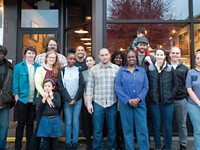
Activating goodwill
Nov 15, 2017 -
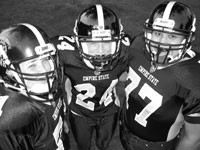
Metro Ink 8.17.05
Aug 17, 2005 -
An apology from our staff
Mar 3, 2004 - More »
